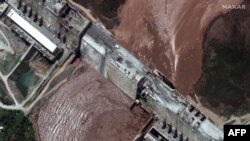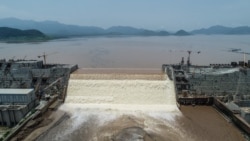Egypt, Ethiopia and Sudan failed to agree on a new negotiating approach to resolve their years-long dispute over the controversial dam that Ethiopia is building on the Blue Nile, the three countries said Wednesday.
In late October, the three resumed virtual talks over the filling and operation of the Grand Ethiopia Renaissance Dam. The renewed talks followed President Donald Trump's comments in which he said downstream Egypt could end up "blowing up" the project, which Cairo has called an existential threat. The remarks angered Ethiopia.
Foreign and irrigation ministers of the three nations met last week and delegated experts from their countries to discuss and agree on an approach so the talks could be fruitful. But differences remained, and Wednesday's meeting failed to bridge the gaps, said Mohammed el-Sebaei, Egypt's Irrigation Ministry spokesman.
Sudanese Irrigation Minister Yasser Abbas also said the talks did not achieve concrete progress, and that Egypt opposed a Sudanese proposal supported by Ethiopia to maximize the role of African Union experts.
Ethiopia said the countries "were unable to reach a complete agreement" on items such as the "basis for the upcoming negotiation and the time frame." It said they would turn to the chair of the AU Executive Council and South Africa's foreign minister "to consult on the next steps."
Key questions remain about how much water Ethiopia will release downstream if a multi-year drought occurs and how the three countries will resolve any future disputes. Ethiopia rejects binding arbitration at the final stage of the project.
El-Sebaei, the Egyptian spokesman, said the three countries would separately report their positions to South Africa, which heads the African Union.
Ethiopia is building the dam on the Blue Nile, which joins the White Nile in Sudan to become the Nile River. About 85% of the river's flow originates from Ethiopia. Officials hope the dam, now more than three-quarters complete, will reach full power-generating capacity in 2023.
Egypt and Sudan, however, have expressed concerns the dam will reduce the flow of the Nile waters to their countries. Egypt relies heavily on the Nile to supply water for its agriculture and to its more than 100 million people.

